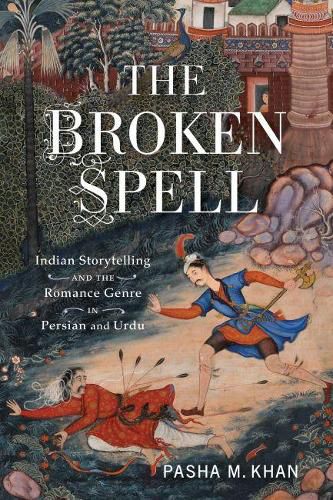Readings Newsletter
Become a Readings Member to make your shopping experience even easier.
Sign in or sign up for free!
You’re not far away from qualifying for FREE standard shipping within Australia
You’ve qualified for FREE standard shipping within Australia
The cart is loading…






This title is printed to order. This book may have been self-published. If so, we cannot guarantee the quality of the content. In the main most books will have gone through the editing process however some may not. We therefore suggest that you be aware of this before ordering this book. If in doubt check either the author or publisher’s details as we are unable to accept any returns unless they are faulty. Please contact us if you have any questions.
The Broken Spell: Indian Storytelling and the Romance Genre in Persian and Urdu is a monograph on the rise and fall in popularity of
romances
(qissah)-tales of wonder and magic told by storytellers at princely courts and in public spaces in India from the sixteenth century to the twentieth. Using literary genre theory, author Pasha M. Khan points to the worldviews underlying the popularity of Urdu and Persian romances, before pre-existing Islamicate rationalist traditions gained traction and Western colonialism came to prominence in India.
In the introduction, Khan explains that it was around the end of the nineteenth century that these marvelous tales became devalued by Orientalists and intellectually colonized Indian elites, while at the same time a new genre, the novel, gained legitimacy. Khan goes on to narrate the life histories of professional storytellers, many of them emigres from Iran to Mughal-ruled India, and considers how they raised their own worth and that of the romance in the face of changes in the economics, culture, and patronage of India. Khan shows the methods whereby such storytellers performed and how they promoted themselves and their art. The dividing line between marvelous tales and history is examined, showing how and why the boundary was porous. The study historicizes the Western understanding of the qissah as a local manifestation of a worldwide romance genre, showing that this genre equation had profound ideological effects. The book’s appendix contains a translation of an important text for understanding Iranian and Indian storytelling methods: the unpublished introductory portions to Fakhr al-Zamani’s manual for storytellers. The Broken Spell will appeal to scholars of folklore and fairy-tale studies, comparative literature, South Asian studies, and any reader with an interest in India and Pakistan.
$9.00 standard shipping within Australia
FREE standard shipping within Australia for orders over $100.00
Express & International shipping calculated at checkout
This title is printed to order. This book may have been self-published. If so, we cannot guarantee the quality of the content. In the main most books will have gone through the editing process however some may not. We therefore suggest that you be aware of this before ordering this book. If in doubt check either the author or publisher’s details as we are unable to accept any returns unless they are faulty. Please contact us if you have any questions.
The Broken Spell: Indian Storytelling and the Romance Genre in Persian and Urdu is a monograph on the rise and fall in popularity of
romances
(qissah)-tales of wonder and magic told by storytellers at princely courts and in public spaces in India from the sixteenth century to the twentieth. Using literary genre theory, author Pasha M. Khan points to the worldviews underlying the popularity of Urdu and Persian romances, before pre-existing Islamicate rationalist traditions gained traction and Western colonialism came to prominence in India.
In the introduction, Khan explains that it was around the end of the nineteenth century that these marvelous tales became devalued by Orientalists and intellectually colonized Indian elites, while at the same time a new genre, the novel, gained legitimacy. Khan goes on to narrate the life histories of professional storytellers, many of them emigres from Iran to Mughal-ruled India, and considers how they raised their own worth and that of the romance in the face of changes in the economics, culture, and patronage of India. Khan shows the methods whereby such storytellers performed and how they promoted themselves and their art. The dividing line between marvelous tales and history is examined, showing how and why the boundary was porous. The study historicizes the Western understanding of the qissah as a local manifestation of a worldwide romance genre, showing that this genre equation had profound ideological effects. The book’s appendix contains a translation of an important text for understanding Iranian and Indian storytelling methods: the unpublished introductory portions to Fakhr al-Zamani’s manual for storytellers. The Broken Spell will appeal to scholars of folklore and fairy-tale studies, comparative literature, South Asian studies, and any reader with an interest in India and Pakistan.